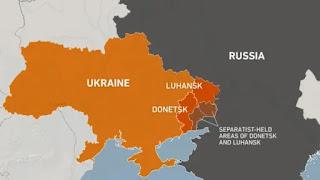
What if University of Alabama football coach Nick Saban announced on a Thursday the first 10 plays Auburn's Bryan Harsin would run in that Saturday's Iron Bowl -- and Saban was right on the money? That's sort of what is happening now as the United States and Russia jockey for position in a possible confrontation over Ukraine. From a report at Axios:
If Russia invades Ukraine and sets off a war in the region, it will be a first of its kind. Writes Dave Lawler, under the headline "Biden and Putin are live-blogging a pre-war":
Never in the history of warfare have two sides offered a real-time, play-by-play deconstruction of movements toward imminent war.
President Biden and Vladimir Putin are each trying to shape the narrative of what is happening in Ukraine and get inside the heads of a global audience — and each other — to gain the upper hand in an information war as a possible prelude to a real one.
U.S. officials say Putin is stoking disinformation in order to blame Ukraine if Russia invades. The White House is trying to announce Putin's plays before he runs them — a novel and risky strategy they hope might stave off an invasion, or at least help unify the international community against it.
Biden more or less stated in a speech last Friday that his strategy at the moment amounts to live-blogging in a pre-war period:
Biden said Friday: "We’re calling out Russia’s plans loudly and repeatedly, not because we want a conflict, but ... to remove any reason that Russia may give to justify invading Ukraine."
U.S. officials have been releasing intelligence for weeks about alleged Russian plans to build a pretext for war. U.S. Secretary of State Tony Blinken took that to a new level on Wednesday by providing a step-by-step description of how the U.S. expects an invasion to unfold. That set the stage for Biden's remarkable address on Friday, in which he said he was "convinced" Putin had decided to launch a full-scale invasion to target the Ukrainian capital, Kyiv.
Moscow has alternated between mocking the dire predictions from Washington — particularly after an invasion target date, floated by U.S. officials, came and went — and condemning them as "aggression" and "information warfare" against Russia. Putin claims the U.S. is trying to bait him into invading.
So far, Blinken's insights have pretty much been on the mark. You could call him "Biden's Nick Saban." Writes Axios' Lawler:
Russia has appeared to follow the playbook Blinken laid out, as part of Moscow's own efforts to shape the narrative around the potential war.
Putin's spokesman claimed Ukraine was planning a major military offensive (despite the fact that 150,000 Russian troops are massed on its borders). Russian officials and state media circulated purported evidence to back Putin's recent claim that a "genocide" is taking place in eastern Ukraine.
Russian-backed separatists in the Donbas region began shelling Ukrainian-held territory while also announcing an evacuation of civilians due to the purported threat from Ukraine.
Putin has surprised the world before, but that's not likely to happen this time:
Reports on Friday that a separatist police chief's car was bombed chimed with Blinken's warning that Russia would fabricate "terrorist attacks" and blame Ukraine.
All of this came after a remarkable head fake from Putin earlier in the week. In televised meetings with top officials, he announced Russia would pull troops back from the border and focus on diplomacy. U.S. officials say that hasn't happened.
If Putin's media strategy is to sow confusion, Biden's is to speak with an almost jarring clarity about what he expects from Russia. The Biden administration has been flooding the airwaves. State Department officials did 16 interviews last Tuesday alone in U.S., Ukrainian and European media. Blinken has been on TV almost continually. Biden made two televised addresses in the span of four days, and used the first to prepare Americans for higher energy prices in the event of war. The administration appears to have taken a lesson from Afghanistan, where it failed to anticipate or prepare the public for a swift Taliban takeover.
Putin, meanwhile, used a joint appearance with Belarusian President Aleksander Lukashenko on Friday to prepare Russians for sanctions, which he claimed would be applied whether there was a war in Ukraine or not. On Saturday, he personally oversaw massive nuclear drills.
The world was caught by surprise when Putin moved into Crimea in 2014 and Georgia in 2008. No one will be surprised if he invades Ukraine again.
